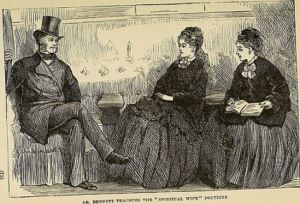News
Danish laws prohibiting polygamy can be circumvented
This article is more than 7 years old.
Some people still like the idea of having more than one wife

Widespread polygamy was common among Mormons until the late 19th century, but now barely 0.7 percent advocate the practice (image: National Publishing Co, Philadelphia PA)
Although it is illegal in Denmark, it appears that polygamy is still being practised under the radar by some Muslims.
Fakti, a group that works with refugees and immigrant women, has come across a number of instances of women talking about marriages involving several wives, reports Berlingske.
Ida Jensen, a social worker with the group, estimates that at least 30 women she has talked to have said their husbands have a second wife. “The women say this is quite a normal practice. They think it is a man’s right according to Islam,” Jensen continued.
Although the subject is taboo, according to the women it is okay if a man takes another wife if the first one is incapable of performing her wifely duties.
A do-it-yourself kind of marriage
Mohammad Khani, an imam and educator at the Ali Mosque in Nordvest, one of the two largest mosques in Denmark, told Berlingske he cannot legally marry a man who comes wishing to take wife number two. However, the rules can be circumvented.
“When you’ve entered into an agreement with the Danish state on citizenship, then you agree to follow the country’s laws and regulations, so legally we cannot do it,” said Khani. “The only thing we can do is to tell people how to get married in a way that does not require an imam,” he added.
“People can recite the ritual themselves and we are not making any secret of how you can do it or that Islam permits several wives, but we do say at the same time that you cannot be registered with two wives with the municipality according to Danish law.”
Not thought to be widespread
Anika Liversage, a senior researcher for the Danish centre for social science research VIVE, has also come across polygamy in her work and has interviewed women whose husbands have taken another wife.
“Generally, the women don’t think this is in order. That’s why typically it is something that takes place on the quiet. I don’t think it is widespread in Denmark, but we don’t have any statistics on it,” said Liversage.
In Denmark, there are several ways to get legally married – in a church or by a recognised religious body or at the town hall. On the other hand, you can also be married in a ceremony that is not legally recognised or binding, such as in the eyes of Odin or Thor.










































